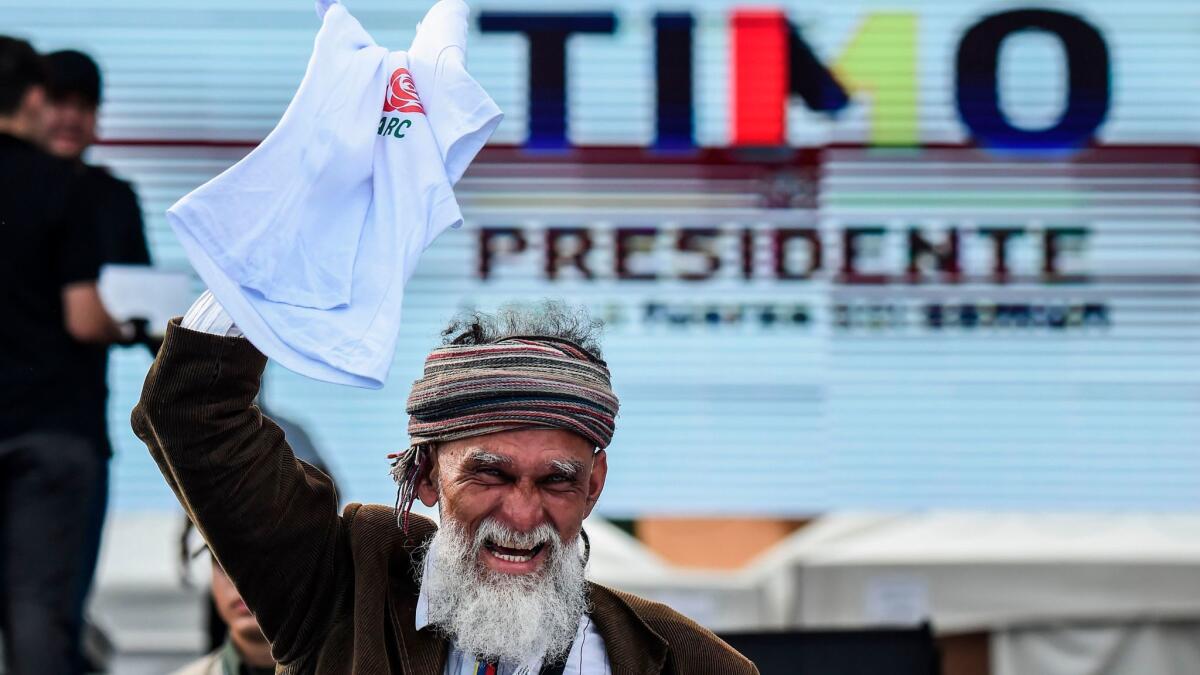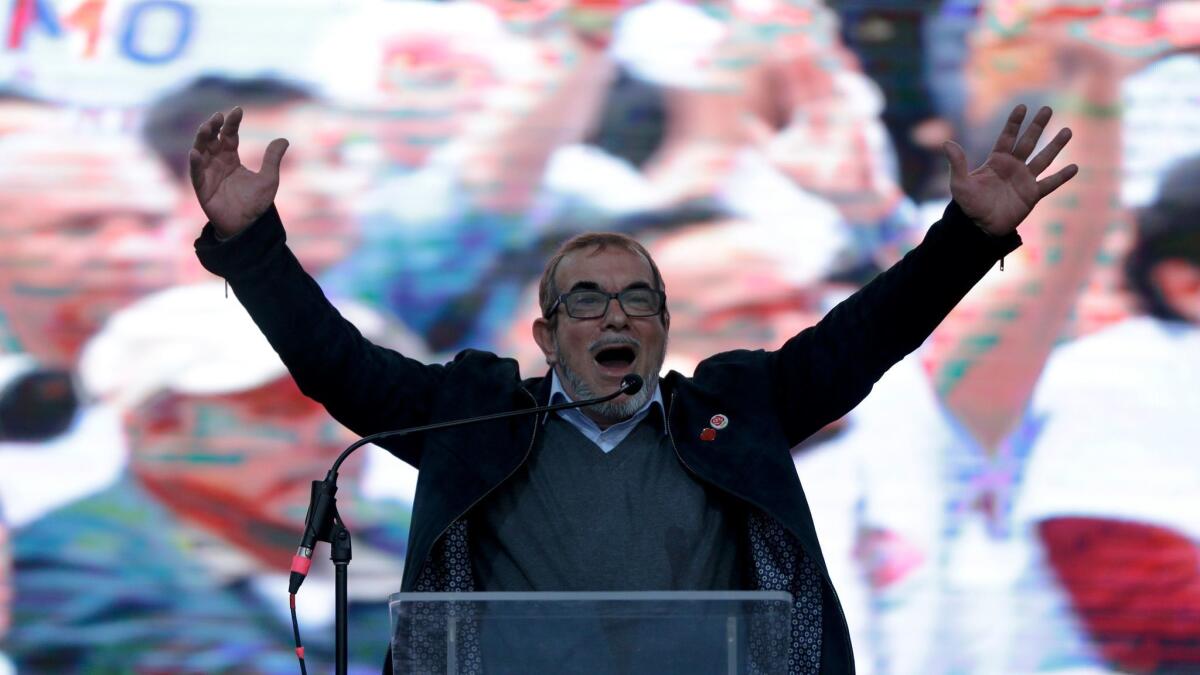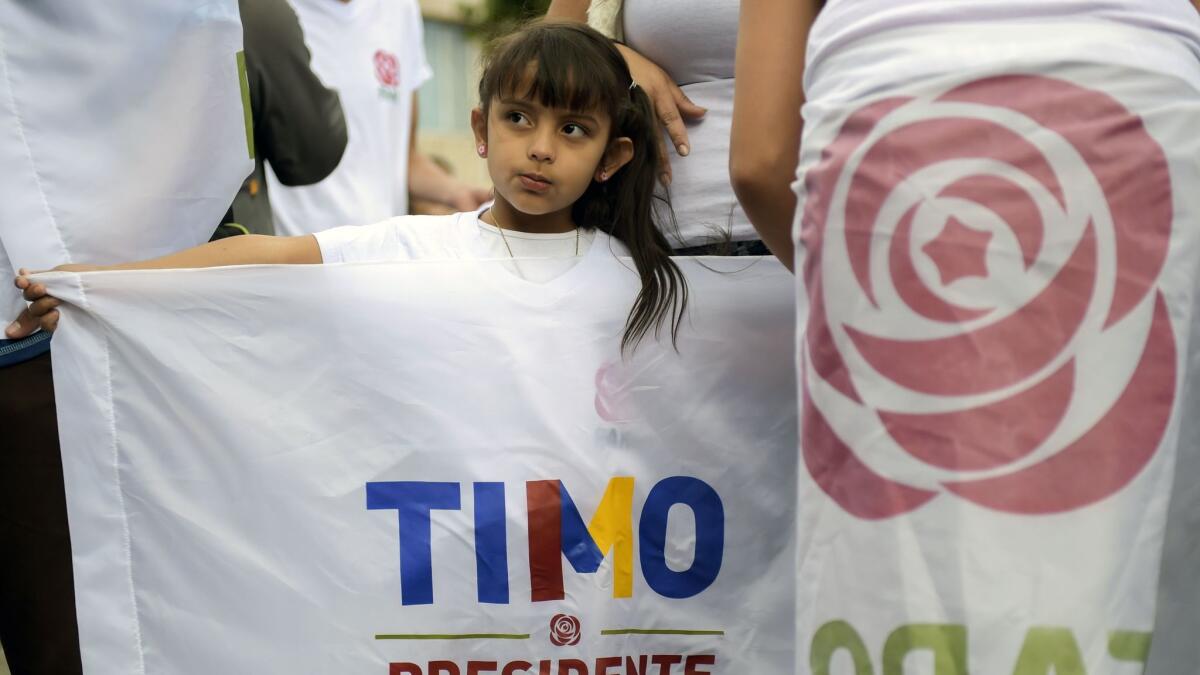Setting aside combat fatigues and weapons, Colombia’s once-fearsome rebels enter world of politics

- Share via
Reporting from BOGOTA, COLOMBIA — Colombia’s demobilized rebel group known as the FARC unveiled its new look as a political organization on Saturday with its presidential candidate promising followers at a rally in Bogota to fight corruption, address social iniquities and fight for the interests of the poor.
Gone were the FARC’s combat fatigues and weapons. At an event attended by an estimated 2,500 in the impoverished and crime-ridden Ciudad Bolivar barrio, the once hyperviolent guerrilla group showed off its new symbol, a rose against a white background. Its slate of candidates appeared on a stage dressed in white long-sleeve shirts.
“Colombia needs a true democracy,” said Rodrigo Londono Echeverri, the onetime rebel leader and now presidential candidate. “The oppressed and millions of poor who have never counted must be heard and be able to decide their future.”
He had long been known by his nom de guerre, “Timochenko,” and posters nodded to that name, referring to him simply as Timo.

Londono, 59, was also the leader of the rebel group during four years of peace negotiations with the Colombian government that culminated in the peace deal that he and President Juan Manuel Santos signed in late 2016. He will face off against other candidates in the first round of voting May 27. If no one scores 50% of votes cast, the top two finishers will then vie in a runoff on June 17.
The rebel group turned political party also introduced candidates for the Senate and the House of Representatives in legislative elections that will take place March 11.
Although terms of the peace deal guaranteed the leftist group five seats in the Senate and five in the lower house in the next two sessions of congress, the FARC is hoping for a good showing in both presidential and congressional balloting to prove its viability as a political party.
“We hope we get votes that at least reflect that number of senators and representatives offered to us by the peace agreement,” said Carlos Alberto Marin, FARC candidate for the house to represent Bogota. “If we get 500,000 votes in March, it means we would have won three or four Senate seats, and we can live with that.”
But some analysts expect the FARC will have a difficult time garnering a half-million votes, which will probably equate to about 3% of the 15 million votes expected to be cast, assuming that voter turnout is 50% of the 30 million eligible to cast ballots. It may seem a modest goal, but the former rebels are hampered by serious image problems. FARC battled the government for more than 50 years, and many Colombians have not forgiven the group for innumerable killings and kidnappings.
As part of the peace accord, FARC admitted committing horrendous crimes, while also insisting that Colombian armed forces committed equally horrible violence. The military has been accused by human rights groups of cooperating with paramilitary death squads and of killing innocent civilian youths and identifying them as guerrillas killed in action to inflate body counts.
Many observers questioned the wisdom of the group’s decision to keep the acronym FARC as the letters of its new political party. Instead of Revolutionary Armed Forces of Colombia, the initials now stand for a moniker that in English translates as Common Alternative Revolutionary Force.
The speeches by Londono and his vice presidential running mate, Imelda Daza, on Saturday gave clear indications that the party’s campaign will seek to exploit widespread disaffection with the ruling class. Both promised to attack corruption, which has disillusioned many Colombians, and to address poverty in a country that has been described as Latin America’s most economically unequal after Haiti.

“Our country has always been governed by a powerful, indolent, mean-spirited, insensitive and egotistical elite that without any scruple has put everything at its service and concentrated our main means of production — land — in the hands of a few,” Daza said. She returned to Colombia from 26 years of exile in Sweden to enter politics under the FARC banner.
It was no coincidence that the FARC staged its first major rally in the Ciudad Bolivar barrio. It is mainly a teeming, crime-ridden shantytown that has quickly grown over the last 20 years to house an influx of poor farm families fleeing violence in Colombia’s countryside and mountainous areas.
“It’s for this identity we feel with the common people that we chose this locality to launch our political struggle,” Londono said. “We know how much you have struggled to obtain water, electricity, streets, health services and transport. Nothing has been given to you, not even schools built by different mayors.…It’s been the product of communal effort, an anxious struggle to overcome.”
To read this article in Spanish, click here
Kraul is a special correspondent.
More to Read
Sign up for Essential California
The most important California stories and recommendations in your inbox every morning.
You may occasionally receive promotional content from the Los Angeles Times.










